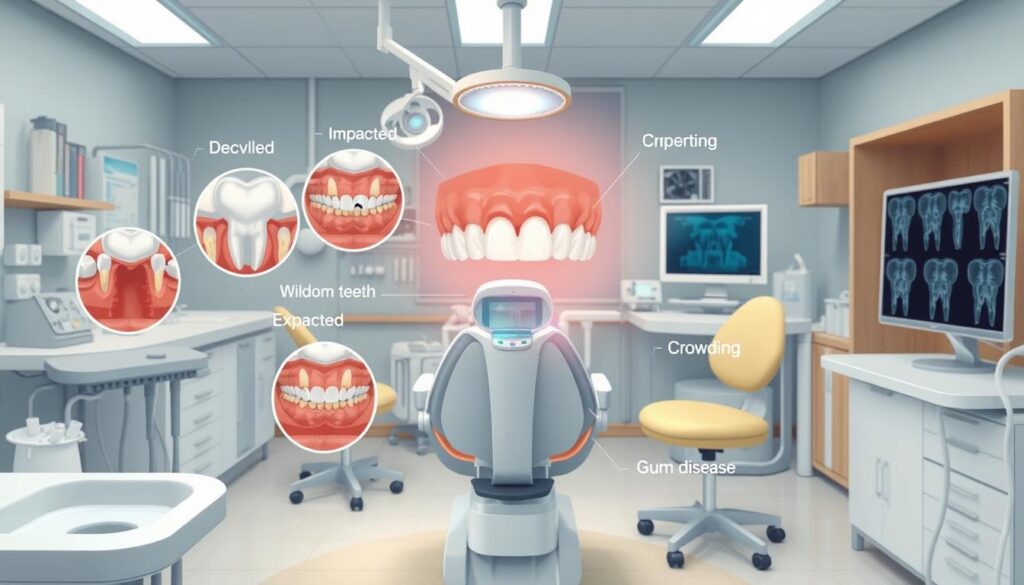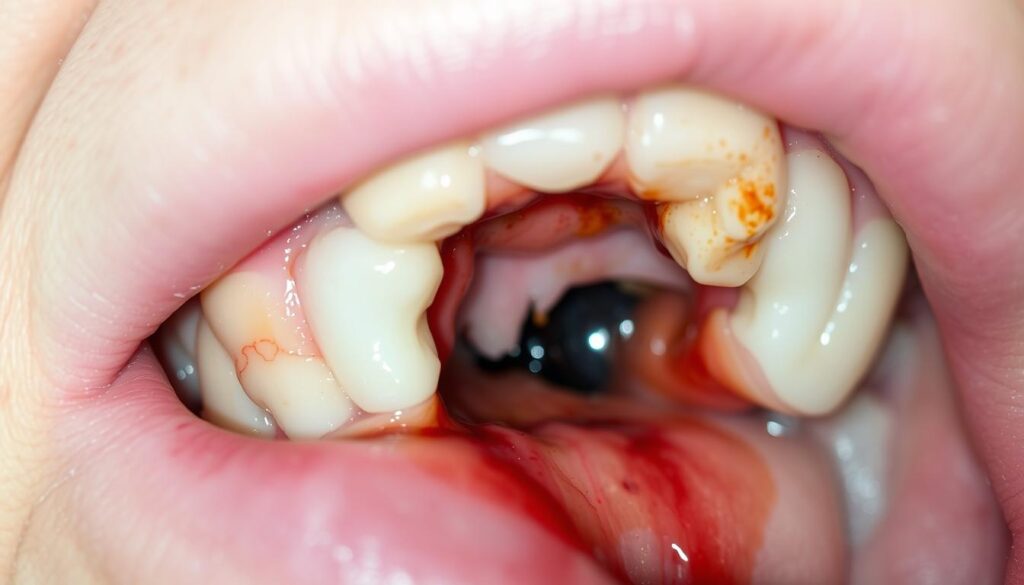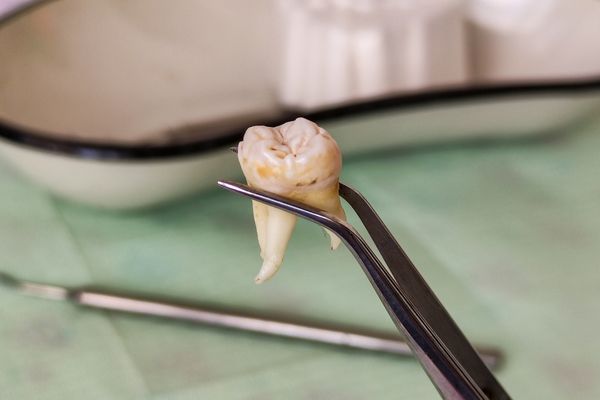Tooth extraction is a common dental procedure. It's important to know how to care for yourself after it. Following the right tips can help you recover well and avoid problems.
After a tooth extraction, rest is key. Your dentist will give you specific advice to follow. Knowing about possible complications can also help you recover better.
This guide is based on advice from the American Dental Association and dental health experts. It's a valuable resource for anyone going through the aftercare of a tooth extraction.
Key Takeaways
- Proper tooth extraction care is vital for successful recovery.
- Follow post-extraction tips provided by your dentist.
- Rest and allow your body time to heal.
- Be vigilant for signs of potential complications.
- Stay hydrated and maintain a balanced diet.
Understanding the Tooth Extraction Process
When you need a tooth pulled, it's good to know why and how it's done. Many people worry about tooth extraction. But learning about tooth extraction reasons can help calm your nerves. Knowing why you need dental surgery can make things clearer.
Reasons for Tooth Extraction
Tooth extraction is needed for a few reasons, including:
- Severe tooth decay: If decay is too much, pulling the tooth is the best choice to stop infection.
- Periodontal disease: Gum disease can make teeth loose. Pulling the tooth helps keep your mouth healthy.
- Overcrowding: Sometimes, a tooth is pulled to make room for others. This is especially true before orthodontic treatment.
- Preventing complications: A tooth might be pulled to avoid future problems, like impacted teeth.
The Extraction Procedure Overview
Knowing about the tooth extraction procedure can help you feel better. Here's what happens:
- Pre-operative evaluation: Dentists check your mouth to see if you need a tooth pulled.
- Anesthesia options: You might get local or general anesthesia to stay comfortable during the procedure.
- Extraction process: The dentist carefully pulls the tooth, trying not to hurt the surrounding tissues.
- Post-operative care: You'll get instructions on how to take care of yourself after the procedure.
Tooth extraction is a common way to keep your mouth healthy. Knowing about dental extraction can make you feel more ready for it.

What to Do After Tooth Extraction?
After a tooth extraction, it's key to follow certain care steps for a smooth recovery. Proper care helps reduce pain and aids in healing. Knowing the initial steps can greatly improve your recovery.
Initial Steps for Care
Right after the extraction, take these steps to help heal:
- Keep gauze over the extraction site: Apply pressure for 30 to 45 minutes to stop bleeding.
- Avoid rinsing or spitting: This prevents the blood clot in the socket from getting dislodged.
- Stay away from strenuous activities: Avoid heavy lifting or intense exercise for at least 24 hours.
- Maintain cleanliness: Rinse your mouth with salt water after 24 hours to keep the area clean.
Managing Pain and Discomfort
Managing pain after dental surgery is a big concern for many. There are several ways to manage pain:
- Use prescribed or over-the-counter pain medications: Take the pain meds as directed by your dentist for the best results.
- Apply cold compresses: Use a cold pack on your cheek near the extraction site for 15 to 20 minutes to reduce swelling.
- Choose soft foods: Eat soft foods like yogurt, smoothies, or mashed potatoes to ease eating discomfort.
Keep an eye on your pain levels. If pain gets worse or doesn't go away, see your dentist for help.
Signs of Complications to Watch For
It's important to watch for signs of trouble after a tooth extraction. Knowing the signs of infection and bleeding can help your recovery. Here are some key signs to look out for and what to do if you see them.
Recognizing Infections
Infections can happen after a tooth extraction. They show up in different ways. Keep an eye out for:
- Unusual swelling around the extraction site.
- Persistent pain that gets worse instead of better.
- Fever with other symptoms.
- Foul odor from your mouth.
If you notice these signs, see a dentist right away. They can help prevent bigger problems.
Dealing with Prolonged Bleeding
Some bleeding after extraction is normal. But if it keeps going, it might be a sign of a bigger issue. Watch for how much bleeding is normal. If it lasts more than 24 hours, you might need to take steps to stop it:
- Bite down on a clean gauze pad for at least 30 minutes.
- Keep your head up to reduce blood flow.
- Avoid activities that make bleeding worse.
If bleeding doesn't stop, you need to see a dentist fast. They can help you recover safely.

Conclusion
Tooth extraction recovery is all about following dental aftercare tips from healthcare pros. It's crucial to stick to these guidelines closely. They play a big role in how well you heal.
Managing pain is also important. Using the right pain relief can make you feel better while you recover. This makes the healing process easier.
Spotting complications early is key to a smooth recovery. Keep an eye out for signs of infection or bleeding that won't stop. Research and patient stories show that being proactive and careful is essential.
By understanding the importance of tooth extraction recovery, you can see dental procedures in a new light. Committing to a thorough recovery plan can make you feel more confident and calm.
FAQ
What are the most important steps to take for tooth extraction care?
First, keep gauze on the extraction site for the time your dentist recommends. This helps control bleeding. Avoid rinsing or spitting and don't do strenuous activities for 24 hours. These steps help your teeth heal well.
How can I manage pain and discomfort after a tooth extraction?
To manage pain, use the pain meds your dentist prescribed or bought over-the-counter. Cold compresses on the area can also help. Eating soft foods also reduces discomfort. If pain doesn't go away, talk to your dentist.
What are the signs of infections to watch for after a dental extraction?
Watch for swelling, fever, and pain that gets worse. These are signs of infection. If you see these, get to your dentist right away.
How long should I expect bleeding to last after a tooth extraction?
Bleeding usually stops in a few hours after the extraction. But if it keeps going or is a lot, use gauze and call your dentist. They can help with bleeding.
Can I eat normally after having a tooth extracted?
No, it's best to eat soft foods for a while. Avoid hot, spicy, or crunchy foods that might hurt the site. As it heals, you can start eating regular foods again.
What complications should I be aware of following a tooth extraction?
Watch out for dry socket, where the blood clot gets dislodged. This causes pain and slows healing. Catching these problems early helps your recovery.
How crucial is post-extraction care for recovery?
Post-extraction care is key for a smooth recovery. It helps avoid problems and speeds up healing. Following your dentist's instructions is very important.
When should I contact my dentist after a tooth extraction?
If you have severe pain, bleeding that won't stop, fever, or any other concerns, call your dentist. Quick action can prevent bigger problems.



